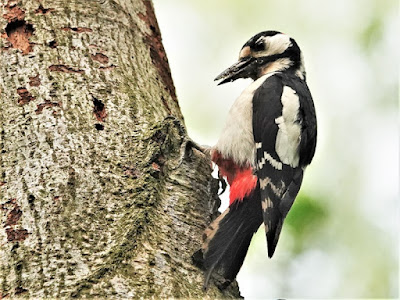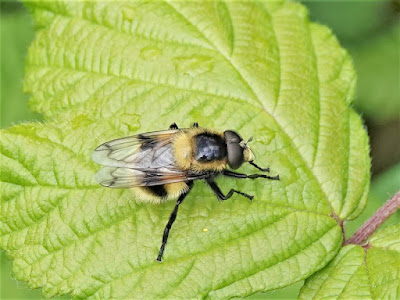10.0°C > 13.0°C: Broken cloud with some sun and also a very light shower. The skies cleared after 09:00. Light south-easterly breeze veering south-westerly and increasing moderate. Very good visibility.
Sunrise: 04:57 BST
* = a species photographed today
! = a new species for me here this year
!! = a new species for me in Shropshire
Priorslee Balancing Lake: 05:05 – 06:20 // 07:20 – 09:50
* = a species photographed today
! = a new species for me here this year
!! = a new species for me in Shropshire
Priorslee Balancing Lake: 05:05 – 06:20 // 07:20 – 09:50
(114th visit of the year)
Bird notes:
- with seven Great Crested Grebes (at least) there was some territorial disputes.
- *a Great Spotted Woodpecker seen feeding a juvenile
- a Lesser Whitethroat was singing again in the south-west wooded area at c.09:00.
- House Sparrows were seen collecting nesting material off of the dam-face. Seems a long way to come from the estate.
Counts of birds noted flying over:
- 2 Canada Geese: a pair flew North
- 1 Greylag Goose: single outbound
- 1 Stock Dove
- 32 Wood Pigeons
- 1 Herring Gull
- 6 Lesser Black-backed Gulls
- 13 Jackdaws
Hirundines etc. noted: see notes
- c.25 Swifts
- 2 Barn Swallows
- 6 House Martins
Warblers noted (the figure in brackets relates to birds heard singing):
- 1 (1) Cetti's Warbler
- 13 (11) Chiffchaffs
- 9 (9) Reed Warblers
- 1 (1) Lesser Whitethroat
- 10 (10) Blackcaps
'nominal' warbler:
- 4 (4) Goldcrests
Counts from the lake area:
- 4 + 5 (1 brood) Canada Geese: an additional pair throughout
- 2 + 1 (1 brood) Greylag Geese
- 2 + 2 (1 brood) Mute Swans
- 4 (4♂) Mallard
- 2 Moorhens
- 20 + 4 (3 broods) Coots
- 7 Great Crested Grebes
Seen on the street lamps poles pre-dawn:
Nothing
Noted later:
Noted later:
Moths:
- *Plain Gold Micropterix calthella
- *!Garden Grass-veneer Chrysoteuchia culmella
- *!Common Marble Celypha lacunana
- *Plain Gold Micropterix calthella
- *!Garden Grass-veneer Chrysoteuchia culmella
- *!Common Marble Celypha lacunana
Bees, wasps etc.:
- *Chocolate Mining Bee Andrena scotica
- Early Bumblebee Bombus pratorum
- Buff-tailed Bumblebee Bombus terrestris
- *ichneumon, possibly in the family Cryptinae.
- ??where are all the wasps? I noted a few in early April and since then none.
- *Chocolate Mining Bee Andrena scotica
- Early Bumblebee Bombus pratorum
- Buff-tailed Bumblebee Bombus terrestris
- *ichneumon, possibly in the family Cryptinae.
- ??where are all the wasps? I noted a few in early April and since then none.
Hoverflies:
- Common Dronefly Eristalis tenax
- *Tiger Hoverfly Helophilus pendulus
- Blotch-winged Hoverfly Leucozona lucorum [Blotch-winged Whitebelt]
- Chequered Hoverfly Melanostoma scalare [Long-winged Duskyface]
- *Dead-head Hoverfly (Myathropa florea) [Batman Hoverfly]
- *Bumblebee Plume-horned Hoverfly Volucella bombylans
- Common Dronefly Eristalis tenax
- *Tiger Hoverfly Helophilus pendulus
- Blotch-winged Hoverfly Leucozona lucorum [Blotch-winged Whitebelt]
- Chequered Hoverfly Melanostoma scalare [Long-winged Duskyface]
- *Dead-head Hoverfly (Myathropa florea) [Batman Hoverfly]
- *Bumblebee Plume-horned Hoverfly Volucella bombylans
Damsel-/dragon-flies:
- *Azure Damselfly Coenagrion puella
- Common Blue Damselfly Enallagma cyathigerum
- *Azure Damselfly Coenagrion puella
- Common Blue Damselfly Enallagma cyathigerum
Other flies:
- Black Snipefly Chrysopilus cristatus: male and female
- *!!long-legged fly Dolichopus ungulatus or similar
- *Scorpion Fly Panorpa sp.
- Yellow Dung Fly Scathophaga stercoraria
- *cranefly Tipula lunata: deceased
many other unidentified species
- Black Snipefly Chrysopilus cristatus: male and female
- *!!long-legged fly Dolichopus ungulatus or similar
- *Scorpion Fly Panorpa sp.
- Yellow Dung Fly Scathophaga stercoraria
- *cranefly Tipula lunata: deceased
many other unidentified species
Bugs etc.:
- *Mirid bug Calocoris alpestris
- Red-and-Black Froghopper Cercopis vulnerata
- *Mirid bug Calocoris alpestris
- Red-and-Black Froghopper Cercopis vulnerata
Beetles:
- Alder Leaf Beetle Agelastica alni
- 7 Spot Ladybird Coccinella 7-punctata
- *!!click beetle Denticollis linearis
- *Harlequin Ladybird Harmonia axyridis var. spectabilis
- Harlequin Ladybird Harmonia axyridis var. succinea
- *False blister Beetle Oedemera lurida/virescens
- Swollen-thighed Beetle Oedemera nobilis
- *Nettle Weevil Phyllobius pomaceus
- Alder Leaf Beetle Agelastica alni
- 7 Spot Ladybird Coccinella 7-punctata
- *!!click beetle Denticollis linearis
- *Harlequin Ladybird Harmonia axyridis var. spectabilis
- Harlequin Ladybird Harmonia axyridis var. succinea
- *False blister Beetle Oedemera lurida/virescens
- Swollen-thighed Beetle Oedemera nobilis
- *Nettle Weevil Phyllobius pomaceus
Arthropods:
- *(Common) Striped Woodlouse Philoscia muscorum
- *(Common) Striped Woodlouse Philoscia muscorum
Molluscs:
- White-lipped Snail Cepaea hortensis
- *Garden Snail Cornu aspersum
- Girdled Snail Hygromia cinctella
- *Kentish Snail Monacha cantiana
- *Hairy Snail Trochulus hispidus
- White-lipped Snail Cepaea hortensis
- *Garden Snail Cornu aspersum
- Girdled Snail Hygromia cinctella
- *Kentish Snail Monacha cantiana
- *Hairy Snail Trochulus hispidus
Spiders:
- *Cucumber Green Orb Spider Araniella sp. possibly A. cucurbitina
- *wolf spider Pardosa sp.
- *Long-jawed Orb-web Spider Tetragnatha sp.
- *Cucumber Green Orb Spider Araniella sp. possibly A. cucurbitina
- *wolf spider Pardosa sp.
- *Long-jawed Orb-web Spider Tetragnatha sp.
New flower species noted:
- *!Common (or Black; or Lesser) Knapweed Centaurea nigra
- !Prickly Sow-thistle Sonchus asper
- *!White Clover Trifolium repens
- *!Common (or Black; or Lesser) Knapweed Centaurea nigra
- !Prickly Sow-thistle Sonchus asper
- *!White Clover Trifolium repens
About as good as it got.
A Great Spotted Woodpecker arrives near its nest with food. Just visible is the red on the nape indicating it is a male.
Approaching the nest hole.
The red on the nape easily seen here.
A rather bug-eyed juvenile with beak wide-open.
Making an enthusiastic reach for the food. Perhaps the adult is introducing it to the great outdoors.
Food gone.
How does it feel to have a punk as an off-spring?
More, more... The red on the juvenile's crown gradually fades from the front as they age.
With the yellow scales on its head this is the first Plain Gold moth Micropterix calthella I have seen for a while.
The start of the dreaded grass moth season. This is a Garden Grass-veneer Chrysoteuchia culmella and a rather pale example. My earliest-ever date for this species.
My first Common Marble moth Celypha lacunana this year. I am sure I will get a better photo – this moth disappeared among the grass stems and I had to use full electronic zoom to isolate it. Electronic zoom, despite what the camera's booklet says, does not give equally sharp results.
A Chocolate Mining Bee Andrena scotica. And no: there is no chocolate mine around the lake!
An ichneumon, possibly in the family Cryptinae.
Another Tiger Hoverfly Helophilus pendulus that to my eyes looked unusually small. Martin Adlam tells me that he has read that small individuals of fly species can occur when the larvae have not completed their growth before they pupate.
A Dead-head Hoverfly (Myathropa florea).
A Bumblebee Plume-horned Hoverfly Volucella bombylans and here...
...zoomed in to show the 'plume-horns' - the short but feathered antennae.
This fly seems to be a long-legged fly Dolichopus ungulatus or similar.
Well now. A Scorpion Fly Panorpa sp. with a rather dead-looking cranefly Tipula lunata. Whether there is a direct connection I cannot say.
I have no thoughts on this fly. The bright red eyes and pale body would seem to be distinctive. But...
Neither have I on this fly despite it looking very distinctive. Neither suggestion from Obsidentify was anywhere near the mark.
Another photo of the Mirid bug Calocoris alpestris. These are not easy to photo. When they detect my approach they usually run underneath the leaves they are on.
A new beetle for me: it is the click beetle Denticollis linearis.
A Harlequin Ladybird Harmonia axyridis of the form spectabilis.
The long snout identifies this as a Nettle Weevil Phyllobius pomaceus.
Also feeding on a buttercup is a (Common) Striped Woodlouse Philoscia muscorum.
At least this Garden Snail Cornu aspersum is not in your garden. Yet!
This is a Hairy Snail Trochulus hispidus. The hairs soon wear off.
An unusual view of a Cucumber Green Orb Spider Araniella sp. possibly A. cucurbitina.
A more normal view of the same individual.
A female wolf spider Pardosa sp. with her egg sac full of spiderlings.
Two Long-jawed Orb-web Spiders Tetragnatha sp. The upper individual has large palps and therefore a male. I assume the other is a female. The pattern on the abdomen of this species is very variable, as with many species of spider, and rarely help to sex the individual.
Just coming in to flower is the Common (or Black; or Lesser) Knapweed Centaurea nigra. This one is being attacked by a snail...
This snail. A Kentish Snail Monacha cantiana.
Ignore the leaves: the flower is my first White Clover Trifolium repens of the year. A False blister Beetle Oedemera lurida or O. virescens photobombs.
(Ed Wilson)
------------------------------------------------------------------------------------------------------
In the Priorslee Avenue tunnel:
Moths:
- *1 Common Marbled Carpet Chloroclysta truncata
- *1 Common Marbled Carpet Chloroclysta truncata
Flies:
- 1 cranefly Nephrotoma quadrifaria
and the usual midges of several species
- 1 cranefly Nephrotoma quadrifaria
and the usual midges of several species
Arthropod:
- 1 White-legged Snake Millipede Tachypodoiulus niger
- 1 White-legged Snake Millipede Tachypodoiulus niger
Spider:
- *1 Amaurobius sp. perhaps a Black Lace-weaver A. ferox
- *1 Amaurobius sp. perhaps a Black Lace-weaver A. ferox
Another form of Common Marbled Carpet moth Chloroclysta truncata.
An Amaurobius spider perhaps a Black Lace-weaver A. ferox.
(Ed Wilson)
------------------------------------------------------------------------------------------------------
The Flash: 06:25 – 07:15
(117th visit of the year)
Bird notes:
- *a single Canada Goose gosling noted: a very recent hatchling it seemed.
- *now 10 (near) adult Mute Swans. It seems to be a home for waifs and strays and beyond the capability of the resident cob to do much about it.
Bird(s) noted flying over here:
None
Hirundines etc. noted:
- 2 Swifts
- 1 House Martin
Warblers noted (the figure in brackets relates to birds heard singing):
- 4 (3) Chiffchaffs
- 3 (3) Blackcaps
'nominal' warbler:
- 2 (2) Goldcrests
Noted on / around the water:
- 31 + 1 (1 brood) Canada Geese
- *10 + 3 (1 brood) Mute Swans
- 14 (12♂) Mallard
- 2 (1♂) Tufted Duck
- 4 Moorhens
- 25+ 4 (2 broods) Coots
- no Great Crested Grebes
Noted elsewhere around The Flash:
Hirundines etc. noted:
- 2 Swifts
- 1 House Martin
Warblers noted (the figure in brackets relates to birds heard singing):
- 4 (3) Chiffchaffs
- 3 (3) Blackcaps
'nominal' warbler:
- 2 (2) Goldcrests
Noted on / around the water:
- 31 + 1 (1 brood) Canada Geese
- *10 + 3 (1 brood) Mute Swans
- 14 (12♂) Mallard
- 2 (1♂) Tufted Duck
- 4 Moorhens
- 25+ 4 (2 broods) Coots
- no Great Crested Grebes
Noted elsewhere around The Flash:
Hoverflies:
- !Common Dronefly Eristalis tenax
- !Common Dronefly Eristalis tenax
Beetles:
- many Alder Leaf Beetles Agelastica alni
- many Alder Leaf Beetles Agelastica alni
A single Canada Goose gosling scurries toward the water.
Taking a ride on mum's back are the three Mute Swan cygnets.
Not easy but count them: there are ten white(ish) Mute Swans in this view.
(Ed Wilson)
------------------------------------------------------------------------------------------------------
Sightings from previous years
2009
Priorslee Lake
3 Little Egrets
(Ed Wilson)
2007
Priorslee Lake
Little Ringed Plover
(John Isherwood)









































